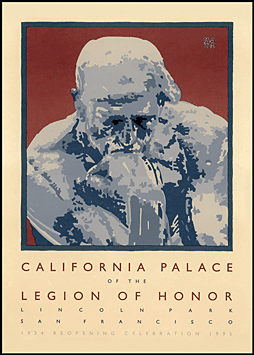
Click on image for detail
(#165) CALIFORNIA PALACE of the LEGION of HONOR:
Edition of 2641 of which 125 copies are signed 1-125, 26 copies are signed A-Z as artist's proofs; 2 are signed as dedication copies, and three sets are signed as progressives.
November 6, 1995 17" x 24" 9 colors
Model: Rodin's sculpture, "The Thinker."
Client: California Palace of the Legion of Honor (Couric Payne, 1-415-750-3609; Robert Johnson, 1-415-750-3679, FAX 1-415-750-3680) 1-125: Dow & Frosini
A-Z: Artist's own use Dedication copies: Robert Flynn Johnson, Couric Payne
Progressives: One set to the Achenbach Foundation for Graphic Arts, and two sets to Dow & Frosini (Print's Regional Design Annual, 1996)
Diogenes the Cynic, son of Hicesias of Sinope, is a half-fabulous Greek philosopher who lived around 400 bc and died some seventy-five years later, execrated, feared, honored and revered. What little is known of him survives in fragments only, though most of it seems to be true. He repudiated all pleasure save pursuit of the truth, and lived in great austerity. He destroyed the single wooden bowl he possessed when he saw a peasant boy drink from his hands. He taught that pain and hunger were helpful in the pursuit of goodness. He went out of his way to offend the rich and powerful, who respected him the more strongly for it. Diogenes masturbated in public and spat on the floor. He was not unusual. The philosopher Socrates corrupted the youth of Athens with his impiety, and by making the weaker argument appear the stronger. For this was condemned to death. What happened in ancient Greece that so changed the world? Was it no more than endless, pitiless questioning of things as they were? Was it these uncouth, aggressive dogs?*
* The Cynics were members or followers of the school of Antisthenes (born c. 444 bc). The name is a pun on the Greek word kynikos, meaning doglike, and the Kynosarges, a gymnasium where Antisthenes taught.